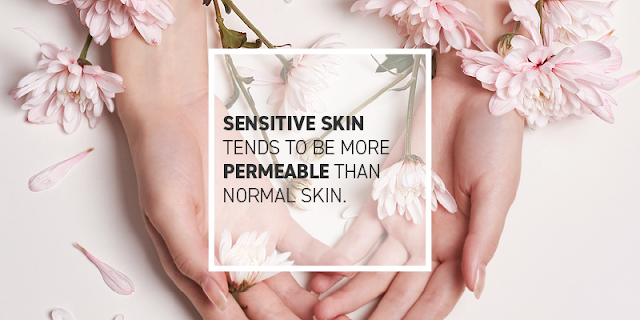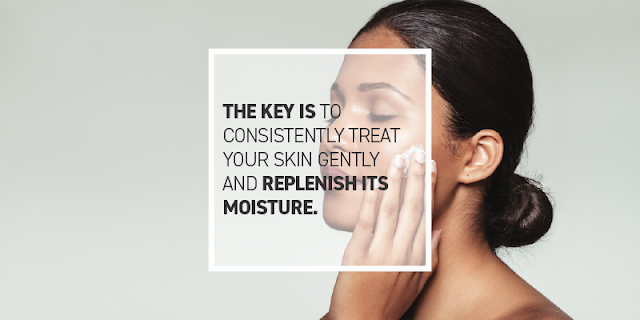A sensitive soul is good. Sensitive skin is not.
There are many reasons your skin may be reactive: cleaning products, eating certain foods, overexposure to sunlight, or even the cosmetics and skincare products you use. Your skin may be sensitive as a result of an allergy (like when you get a rash from fragrance ingredients), or irritation (such as when your acne treatment product chapped your skin).
How you choose to work with your sensitive skin and optimize the care you give it is up to you.
What’s Wrong with Sensitive Skin?
Sensitive skin tends to be more permeable than normal skin. This means that molecules and irritants pass through the skin barrier much easier than is typical. This is not good for two main reasons:
- Natural, nourishing moisture escapes faster than it should.
- Harsh ingredients in your skincare products and cosmetics penetrate into your skin more readily.
Where to Start
The best skincare for sensitive skin optimizes strategies to stop or combat these adverse events. You’ll need to do more than just search for products labeled as “hypoallergenic,” “for sensitive skin,” or “dermatologist-recommended,” as there’s very little regulation when it comes to statements made on beauty product labels. To wit, a study published in JAMA Dermatology showed that 83 percent of products considered to be “hypoallergenic” contained at least one common allergen ingredient!
Instead of relying on product labels and advertisements, do some research on your own.
- Read the ingredients list for inclusions known to cause reactions, sensitivities, and allergies. The most common skin irritant is fragrance, says Dr. Marisa Garshick, MD, an NYC-based dermatologist and assistant clinical professor of dermatology at Weill Cornell Medical College. “If someone comes in with sensitive skin, that would be the first ingredient I would advise them to avoid. If they are still sensitive, that’s when avoiding some other ingredients can be helpful.” Parabens, lanolin, and propylene glycol are also commonly implicated as irritants. In fact, propylene glycol was listed as an allergen of the year by the American Contact Dermatitis Society early in 2018. Other culprits to avoid: tocopherol, methylisothiazolinone, and various formaldehyde releasers like DMDM hydantoin and Diazolidinyl urea.
- Consult your dermatologist before purchasing a product and adding it to your skincare routine, particularly if your symptoms can be severe. They’ll help you figure out what your triggers are so you can plan to avoid them.
- Try a skin test before applying anything to your face. Test a new product on a tiny area of skin (not your face). Watch it for 72 hours for any redness, reaction, tingling, or burning. If you experience any of these things, ditch that product!
Tweak Your Sensitive Skin Care Routine
If your skin has proven to be sensitive and reactive, you’ll want to pay close attention to the routine that you follow. There are strategies that will help to improve your compromised skin barrier. According to Dr. Cynthia Bailey, a board-certified dermatologist in Sebastopol, California, the key is to consistently treat your skin gently and replenish its moisture. Some common skincare practices like exfoliating may be things you want to skip, as they tend to aggravate sensitive skin.
- While you want to choose a facial cleanser that removes all the dirt and grime, pick the mildest one that still gets the job done. If your face feels tight after washing, you’ve stripped too many of your natural (beneficial) oils away and irritated your skin.
- Go easy on the hot water when washing your face or in the shower. That will wipe out your natural oils and dehydrate your skin. Opt for shorter, warm showers and use gentle soaps. Rinse all the suds off completely.
- Sensitive skin requires that you preserve moisture to prevent it from drying out. Apply a moisturizer made for sensitive skin that includes rich oils and water-binding ingredients like hyaluronic acid, which can hold 1,000 times its own weight in water. Applying a moisturizer within three minutes of toweling off will lock in the moisture that your skin absorbed during your wash time.
Sunscreen for Sensitive Skin
Too much solar radiation can damage skin cells and cause rashes, aggravating sensitive skin. That, coupled with the fact that cumulative sun exposure through the course of your life leads to aging signs like wrinkles, age spots, and fragile, thin skin, applying a broad-spectrum sunscreen to any exposed skin is important all year long. Some ingredients in sunscreens can prove troublesome for your sensitive skin. Check out this Sunscreen Comparison Chart by Dr. Bailey to find the one that may best suit you.
Other External Factors
Environmental factors and some of your bad habits can take a toll on your skin, even on the best of days. If you suffer from skin sensitivities, these things will only aggravate your issues. Excessive pollution, which you may not be able to control, as well as habits you have control over like smoking, stress, lack of sleep, or alcohol consumption, can cause sensitive skin to flare up with rashes or could trigger worse problems.
Pay Attention to Your Food and Water Intake
We can’t stress enough the importance of a healthy diet and water consumption. When you are the bearer of sensitive skin, this may be one of your biggest allies. Healthy eating habits flush out toxins and give you glowing skin. Drink lots of water and fresh juices to keep your skin hydrated. According to Stylecraze, this is the most important of beauty tips for sensitive skin.
Some food may not be right for you and can cause reactions with your skin, increasing sensitivity. If you suspect this may be the case, keep a journal of what you eat and when and how your skin reacts. Make a note to avoid these foods in the future.
Skin Care Tips From MDSUN Skin Care®
Please Visit Our Official Website - MDSUN Skin Care




Comments
Post a Comment